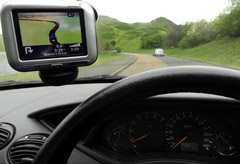Satnavs could aid terrorist attack in Britain
Engineers warn that Britain’s reliance on the GPS navigation system could aid cyber terrorists by causing havoc with banks, shipping and roads.

Engineers warn that Britain’s reliance on the GPS navigation system could aid cyber terrorists by causing havoc with banks, shipping and roads.
Satellite navigation technology has become an indispensible part of our everyday lives, from road safety to banking, but experts believe dependency on these systems could increase Britain's susceptibility towards cyber aided terrorism.
Professor Martyn Thomas, chairman of the Royal Academy of Engineering’s working group, said an accidental or deliberate system failure, particularly the threat from terrorist interference, could conceivably cause loss of life.
‘The UK is already dangerously dependent on GPS,’ he says. ‘A significant failure of GPS could cause lots of services to fail at the same time, including many that are thought to be completely independent of each other.’
In a recent update on its forthcoming Galileo sat-nav network, The European Commission, estimates that about 7% of Europe's GDP, approximately £690 billion, is dependent in some way on GNSS, emphasising the innate vulnerability of such systems.
While the majority of us use navigation systems to get us from A to B, the technology affects other areas of everyday life, including the emergency services, supermarket lorries, shipping firms and aircraft navigation.
Mobile phones and digital radio stations also rely on signals and while the combination of this dependency could essentially lead to food shortages, road accidents and airport delays, more worryingly the interdependence of these systems leaves Britain open to criminal activity.
Celebrity news, beauty, fashion advice, and fascinating features, delivered straight to your inbox!
The Royal Academy of Engineering report says GPS back-up systems are insufficient, while Mr Cockshott, of the Digital Systems Knowledge Transfer Network says equipment is too readily and cheaply available to criminals, increasing Britain's vulnerability towards terrorism.
Jammers can be purchased off the internet for a mere £20 to disable GPS units. 'It's already illegal to put
GNSS jamming equipment on the market in the UK,' says Prof Jim Norton.
'The problem is it's not necessarily illegal to hold it, to import or
even advertise it.'
Dr Thomas concludes: 'The back-up systems are often inadequate or un-tested, jammers are far too easily available and the risks from them are increasing; no one has a full picture of the dependencies on GPS and these risks could be managed and reduced if government and industry worked together.'